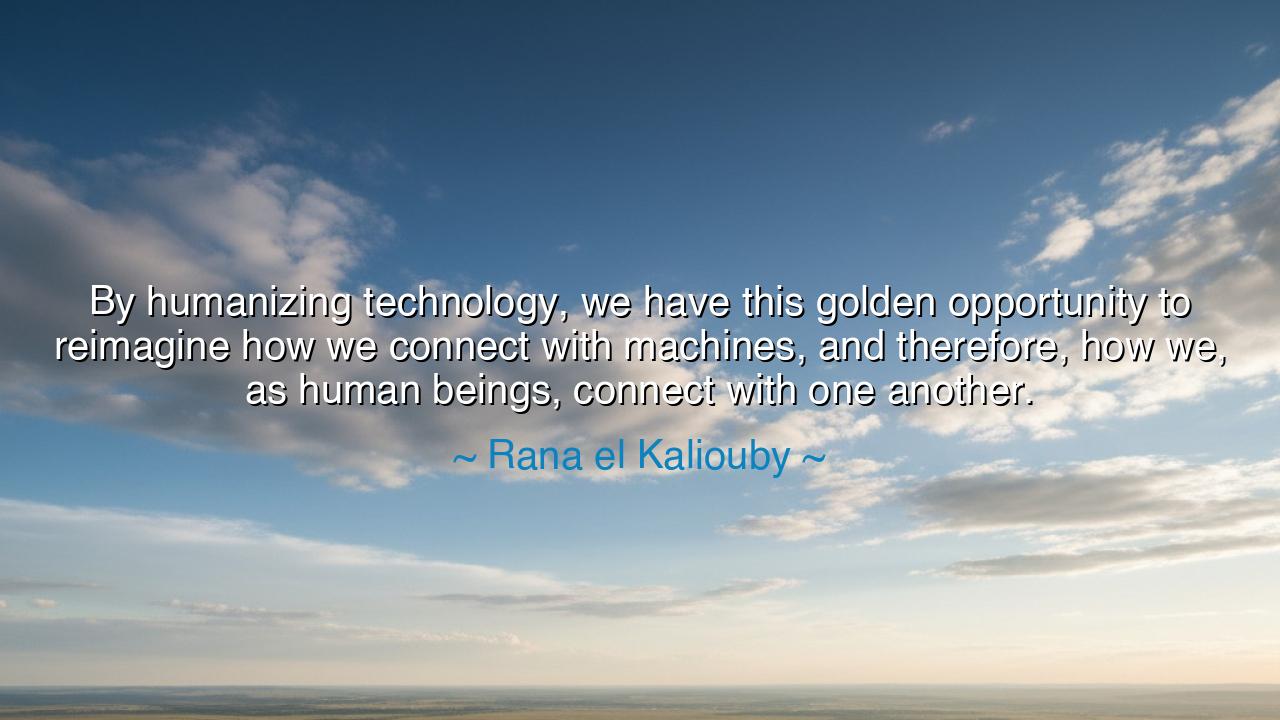
By humanizing technology, we have this golden opportunity to
By humanizing technology, we have this golden opportunity to reimagine how we connect with machines, and therefore, how we, as human beings, connect with one another.






Hear now, O seekers of wisdom, the words of Rana el Kaliouby, pioneer of a new age: “By humanizing technology, we have this golden opportunity to reimagine how we connect with machines, and therefore, how we, as human beings, connect with one another.” This saying is not merely about circuits and code—it is about the essence of our age. For the tools we fashion no longer rest only in iron and fire; they now learn, perceive, and respond. And if we breathe into them the qualities of empathy and understanding, then we do not only change our bond with machines—we transform our bond with each other.
From the dawn of invention, mankind has sought to extend the reach of the hand, the eye, the mind. The wheel gave swiftness, the plow gave abundance, the press gave knowledge. Yet all these were silent servants, cold to human need beyond their function. Now we stand at a new threshold, where technology can learn to perceive emotion, to read the unspoken signals of our hearts, to mirror our humanity back to us. This is the reimagining el Kaliouby speaks of: not merely faster machines, but machines that are humanized, capable of serving us in ways that nurture connection rather than isolation.
Consider, O listeners, the tale of the telephone. When it was first born, many feared it would estrange us, for how could a disembodied voice replace the warmth of presence? Yet, when soldiers far from home heard their children’s laughter carried across wires, the telephone became more than technology—it became a bridge of love. So too may future machines, if humanized, become bridges rather than barriers, connecting not only minds but hearts.
But beware: the opposite is also true. For if we fashion machines without humanity, we risk deepening our alienation. Think of the early factories of the Industrial Age, where men and women became extensions of their machines—stripped of dignity, reduced to cogs. When technology is dehumanized, it does not elevate us, it diminishes us. Thus, the choice lies before us: to humanize the machine, so that it amplifies our compassion, or to remain indifferent, and allow it to widen the cold distance between souls.
The meaning of el Kaliouby’s words is this: that the tools we build will shape the future of our relationships, not only with machines, but with each other. A machine that can understand sadness may comfort the lonely. A device that can read frustration may prevent conflict. A system that fosters kindness may inspire kindness in return. To reimagine our bond with machines is to reimagine the very fabric of society, for the way we design our tools reflects the way we value one another.
The lesson for you, O hearer of wisdom, is profound. Do not think of technology as distant or neutral. It is the mirror of our values. If we build it with greed, it will amplify greed. If we build it with compassion, it will multiply compassion. Thus, the true task is not merely in circuits and code, but in the virtues we choose to weave into them. Each of us, as creators, leaders, or users, carries responsibility for shaping this future.
Practical steps lie before you. When you design or use a tool, ask yourself: “Does this bring me closer to others, or farther apart?” Choose technology that uplifts, that nurtures empathy, that strengthens bonds. Encourage builders to place humanity at the center of their designs. Practice compassion in your own interactions, for as machines learn from us, they will carry forward the patterns we model. Let your choices, small though they seem, ripple outward into the greater reimagining of connection.
Therefore, O children of tomorrow, remember Rana el Kaliouby’s vision: to humanize technology is not a matter of science alone, but of spirit. It is the golden opportunity to reshape not only our machines, but ourselves. If you seize it, then the tools of the future will not estrange, but embrace; they will not divide, but unite. And in that union, mankind will find a deeper, richer way of being together—human with human, and human with machine.






AAdministratorAdministrator
Welcome, honored guests. Please leave a comment, we will respond soon